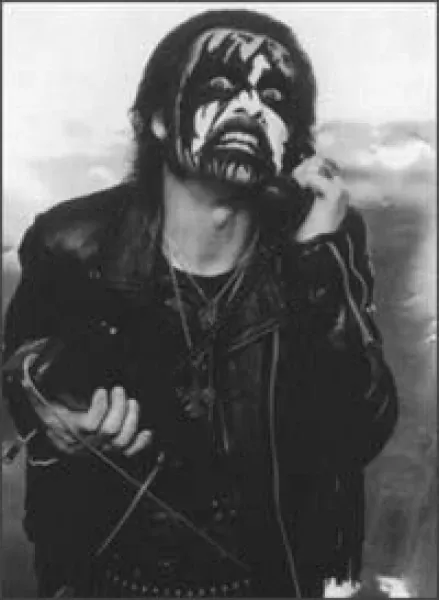
King Diamond
Top King Diamond albums
Top King Diamond lyrics
A Mansion In Darkness (Reissue)
King DiamondA Mansion in Darkness (rough mix)
King DiamondKing Diamond biography
Widely regarded as the finest vocalist in all of d**h metal (who possesses a multi-octave range), theatrical rocker King Diamond first rose to prominence as a member of Mercyful Fate, before launching a solo career on his own. Born Kim Bendix Petersen in Denmark on June 14, 1956, the future King Diamond was originally drawn to theatrically based hard rock due to such trailblazers as Alice Cooper, and soon began fronting local bands in the '70s, including a punk metal outfit called the Brats. Shortly thereafter, the group mutated into Mercyful Fate, consisting of members Hank Shermann (guitar), Michael Denner (guitar), Timi Hansen (ba**), and Kim Ruzz (drums), in addition to Diamond. Diamond, by this time, had developed an interest in the occult, which reflected in the new group's subject matter, as the frontman began wearing makeup (which resembled a cross between his hero Cooper and Kiss' Gene Simmons). br /br /After several demos made their way across Europe (and even reaching America via an underground tape-trading network among metalheads), Mercyful Fate issued a self-titled four-track EP before inking a recording contract with Roadrunner Records. The quintet issued a pair of thrash metal cla**ics, 1983's Melissa and 1984's Don't Break the Oath, as Diamond's satanic lyrics created quite a stir at the time with outsiders. Despite a promising future, Mercyful Fate broke up when a common musical style couldn't be agreed on (Diamond wanted to continue with thrash metal, while a few of the others wanted to explore more mainstream-oriented hard rock). br /br /Undeterred, Diamond launched a solo project, which was almost identical in approach, both musically and visually, as his former band. The group's original lineup included such former Mercyful Fate bandmates as Hansen and Denner, but over time, bandmembers would come and go (the only constant member besides their leader has been guitarist Andy LaRocque). King Diamond's first three solo releases, 1986's Fatal Portrait, 1987's Abigail, and 1988's Them, are widely considered to be Diamond's finest, as the singer continued to issue further releases until the early '90s (1989's Conspiracy, 1990's The Eye). It was also around this time that Diamond found his name embroiled in controversy -- due to a Geraldo Rivera TV special on music with supposed "hidden messages," and when Kiss' Simmons served a lawsuit against the singer, claiming that the makeup design Diamond had been using too closely resembled the one that Simmons used in the '70s and early '80s, which resulted in an out of court settlement and with Diamond being forced to modify his makeup design. br /br /Come the early '90s, Mercyful Fate was constantly being name-checked as a prime influence by just about every new thrash and d**h metal band, which led to a re-formation of the original group (save for drummer Ruzz), and such further releases as 1993's In the Shadows (which included a remake of their early track, "Return of the Vampire," with Metallica's Lars Ulrich sitting in on drums), 1994's Time, 1996's Into the Unknown, 1998's Dead Again, and 1999's 9. By the middle of the '90s, Diamond began issuing solo albums again (simultaneously with his Fate output), as such titles as 1995's The Spider's Lullabye, 1996's The Graveyard, 1998's Voodoo, 2000's House of God, and 2002's Abigail II: The Revenge were issued. ~ Greg Prato, All Music Guide
